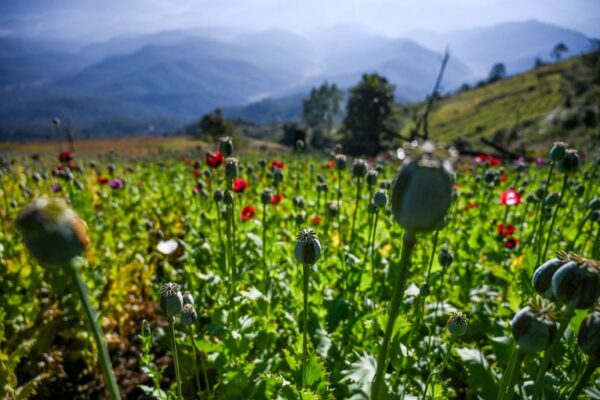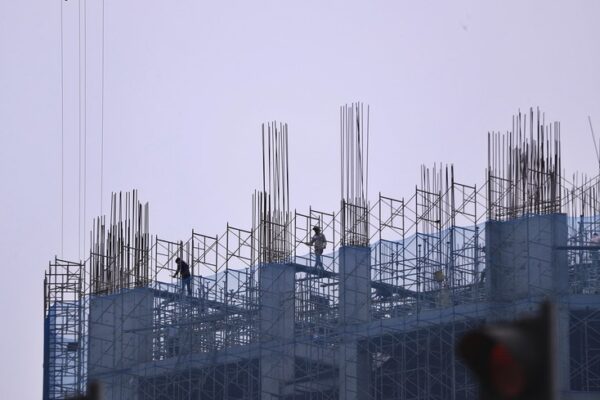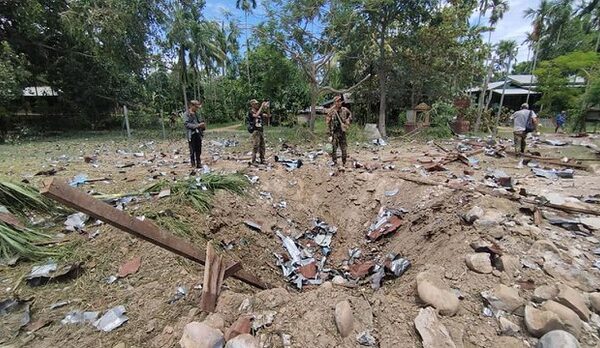
Junta attack claims lives of 3 people in Myanmar’s Rakhine State
The junta army’s heavy artillery shelling in Myanmar’s ancient capital of Mrauk-U in Rakhine State between Sunday and Monday resulted in the deaths of three civilians and the arrest of nine others, local residents told Radio Free Asia on Monday. The shelling also caused damage to an archaeological museum that is renowned for its ancient Buddhist pagodas and temples, they added. Locals said that the junta army has been continuously firing heavy weapons all over the Mrauk-U city after the battle between the junta army and the anti-junta force Arakan Army (AA) on Sunday. The roof and antiques inside of the Cultural Museum which displayed the ancient cultural heritages in the city’s Nyaung Pin Zay neighborhood were damaged by a junta heavy weapon at around 5 a.m. on Sunday, according to locals. Three monasteries, Setdamma Sukarama, Gandamar, Mingalar Man Aung, and some houses in the city were also damaged during the attack, a monk in the city who wished to remain anonymous for fear of reprisals told RFA Burmese on Monday. “They [junta troops] are shooting with heavy artillery continuously. We could not enter the city and there was no one in the city. The fighting broke out on Sunday [Dec. 24] morning. They are shooting with heavy weapons all day and night,” said the monk. The archaeological museum in Mrauk-U’s Nan Yar Kone was hit and destroyed by junta heavy artillery on Dec. 25, 2023. (Citizen journalist) The AA launched attacks on the police station and junta camp on the hill near Ngwe Taung Pauk bridge on the way out of Mrauk-U city early Sunday morning, and the junta responded with heavy weapons, killing three residents and injuring at least five others in the city, the locals explained. Another anti-junta force Three Northern Alliances also confirmed in a Sunday statement that the junta army had targeted the city’s residential areas of civilians and villages with heavy weapons. After the battle, about 70 soldiers from Mrauk-U-based junta Infantry Battalion (377) entered the city’s Aung Mingalar and Bandula neighborhoods and arrested nine civilians, said local residents. The arrested include a 25-year-old man, Wai Lin Che, a 35-year-old man, Maung Hla Bu and a 50-year-old, Aung Tin Shwe. The names of the rest are still unknown. A Mrauk-U resident, who declined to be named for security reasons, told RFA Burmese that the junta troops arrested the civilians to use them as a human shield. “They were arrested on Sunday afternoon. The junta troop assumed that the AA troops were also in the city. The [junta] troops were afraid of being attacked when they patrol into the city, so they took the civilians as human shields. All the residents are fleeing and some of the names [of those arrested] still unknown,” he told RFA Burmese. This photo shows a group of Arakan Army officers. (Arakan Army) Anti-juta forces the Three Brotherhood Alliances also confirmed the arrest on Sunday night and said the nine civilians were arrested by the military council. Locals said that almost the entire city residents had to flee amid arrests, battles and casualties. As of 2014, the population of Mrauk-U stood at around 40,000. Junta’s military council has not released any statement about the incidents. Both Hla Thein, the council’s spokesman for Rakhine state and Attorney General, and Maj. Gen. Zaw Min Tun, a military council spokesman, did not answer RFA’s inquiries. Meanwhile, the AA released a statement on Monday that it will “respond effectively” to the military council army that deliberately attacked and destroyed the ancient cultural heritage of the Rakhine people. Separately, the shadow National Unity Government (NUG) blamed the junta in a Monday statement calling its attack on the museum “inhumane” and “act of war crime,” adding that it is bringing these cases to domestic and international courts. Translated by RFA Burmese. Edited by Taejun Kang and Elaine Chan.




